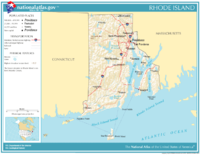Rhode Island
Rhode Island (/ˌroʊd-/ ⓘ ROHD)[6][7] is a state in the New England region of the Northeastern United States. It borders Connecticut to its west; Massachusetts to its north and east; and the Atlantic Ocean to its south via Rhode Island Sound and Block Island Sound; and shares a small maritime border with New York, east of Long Island.[8] Rhode Island is the smallest U.S. state by area and the seventh-least populous, with slightly fewer than 1.1 million residents as of 2020;[9] but it has grown at every decennial count since 1790 and is the second-most densely populated state, after New Jersey. The state takes its name from the eponymous island, though nearly all its land area is on the mainland. Providence is its capital and most populous city.
This article is about the U.S. state. For the geographic feature, see Aquidneck Island. For other uses, see Rhode Island (disambiguation).
Rhode Island
May 29, 1790 (13th)
Greater Boston (combined)
Providence (metro and urban)
Sabina Matos (D)
Jack Reed (D)
Sheldon Whitehouse (D)
1: Gabe Amo (D)
2: Seth Magaziner (D) (list)
1,545 sq mi (4,001 km2)
1,034 sq mi (2,678 km2)
511 sq mi (1,324 km2)
48 mi (77 km)
37 mi (60 km)
200 ft (60 m)
812 ft (247 m)
0 ft (0 m)
1,098,163[4]
1,006/sq mi (388/km2)
$63,870[5]
Rhode Islander
De jure: None
De facto: English
UTC–04:00 (EDT)
R.I.
41° 09′ N to 42° 01′ N
71° 07′ W to 71° 53′ W
Native Americans lived around Narragansett Bay for thousands of years before English settlers began arriving in the early 17th century.[10] Rhode Island was unique among the Thirteen British Colonies in having been founded by a refugee, Roger Williams, who fled religious persecution in the Massachusetts Bay Colony to establish a haven for religious liberty. He founded Providence in 1636 on land purchased from local tribes, creating the first settlement in North America with an explicitly secular government.[10] The Colony of Rhode Island and Providence Plantations subsequently became a destination for religious and political dissenters and social outcasts, earning it the moniker "Rogue's Island".[11]
Rhode Island was the first colony to call for a Continental Congress, in 1774, and the first to renounce its allegiance to the British Crown, on May 4, 1776.[12] After the American Revolution, during which it was heavily occupied and contested, Rhode Island became the fourth state to ratify the Articles of Confederation, on February 9, 1778.[13] Because its citizens favored a weaker central government, it boycotted the 1787 convention that had drafted the United States Constitution,[14] which it initially refused to ratify;[15] it finally ratified it on May 29, 1790, the last of the original 13 states to do so.[16][17]
The state was officially named the State of Rhode Island and Providence Plantations since the colonial era but came to be commonly known as "Rhode Island". In November 2020, the state's voters approved an amendment to the state constitution formally dropping "and Providence Plantations" from its full name.[18] Its official nickname is the "Ocean State", a reference to its 400 mi (640 km) of coastline and the large bays and inlets that make up about 14% of its area.[19]
Name[edit]
Origin of the name[edit]
Despite its name, most of Rhode Island is on the U.S. mainland. Its official name was State of Rhode Island and Providence Plantations from its beginning in 1636 until 2020, and it is referred to in that manner in the United States Constitution.[20] This name was derived from the merger of Colonial settlements around Narragansett Bay, and outside the jurisdiction of Plymouth colony. The settlements of Rhode Island (Newport and Portsmouth) were on Rhode Island, also known as Aquidneck Island.[b][21] Providence Plantations referred to settlements on the mainland of Providence and Warwick.[22]
It is unclear how the island came to be named Rhode Island, but two historical events may have been influential:
List of state symbols
Rhode Island Red chicken
Gallus gallus domesticus
Blue Violet
Viola sororia
American burying beetle
Nicroforus americanus
Red Maple
Acer rubrum
Legislation and taxes[edit]
Rhode Island is one of 21 states that have abolished capital punishment; it was second do so, just after Michigan, and carried out its last execution in the 1840s. Rhode Island was the second to last state to make prostitution illegal. Until November 2009 Rhode Island law made prostitution legal provided it took place indoors.[193] In a 2009 study Rhode Island was listed as the 9th safest state in the country.[194]
In 2011, Rhode Island became the third state in the United States to pass legislation to allow the use of medical marijuana. On May 25, 2022, Rhode Island fully legalized recreational use of marijuana, becoming the nineteenth state to do so.[195] Additionally, the Rhode Island General Assembly passed legislation that allowed civil unions which Governor Lincoln Chafee signed into law on July 2, 2011. Rhode Island became the eighth state to fully recognize either same-sex marriage or civil unions.[196] Same-sex marriage became legal on May 2, 2013, and took effect August 1.[197]
Rhode Island has some of the highest taxes in the country, particularly its property taxes, ranking seventh in local and state taxes, and sixth in real estate taxes.[138]



